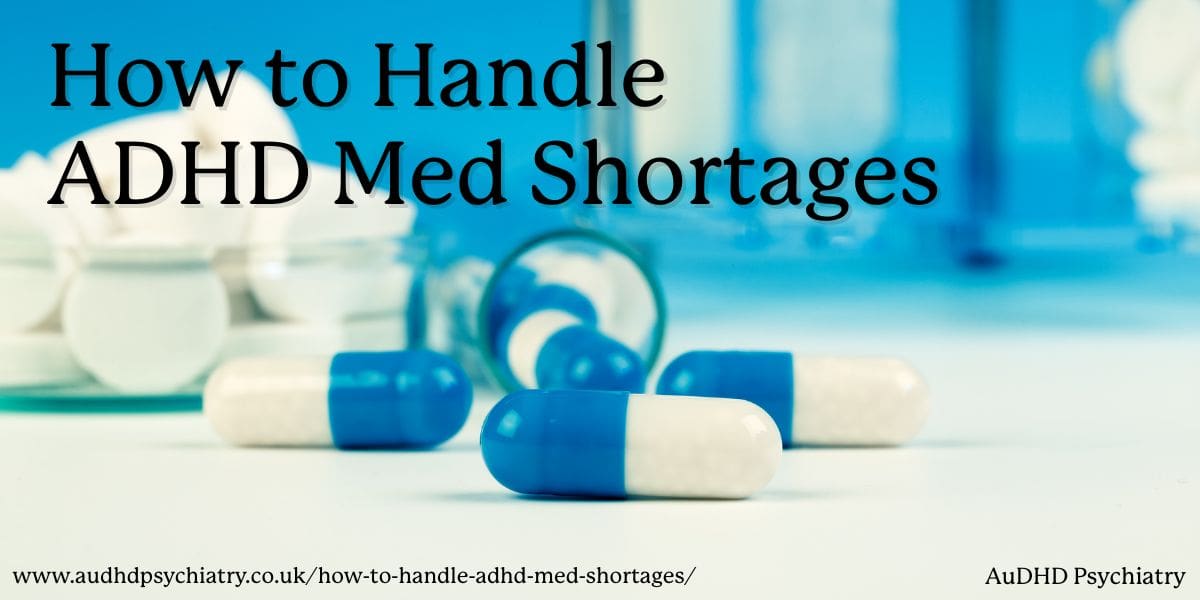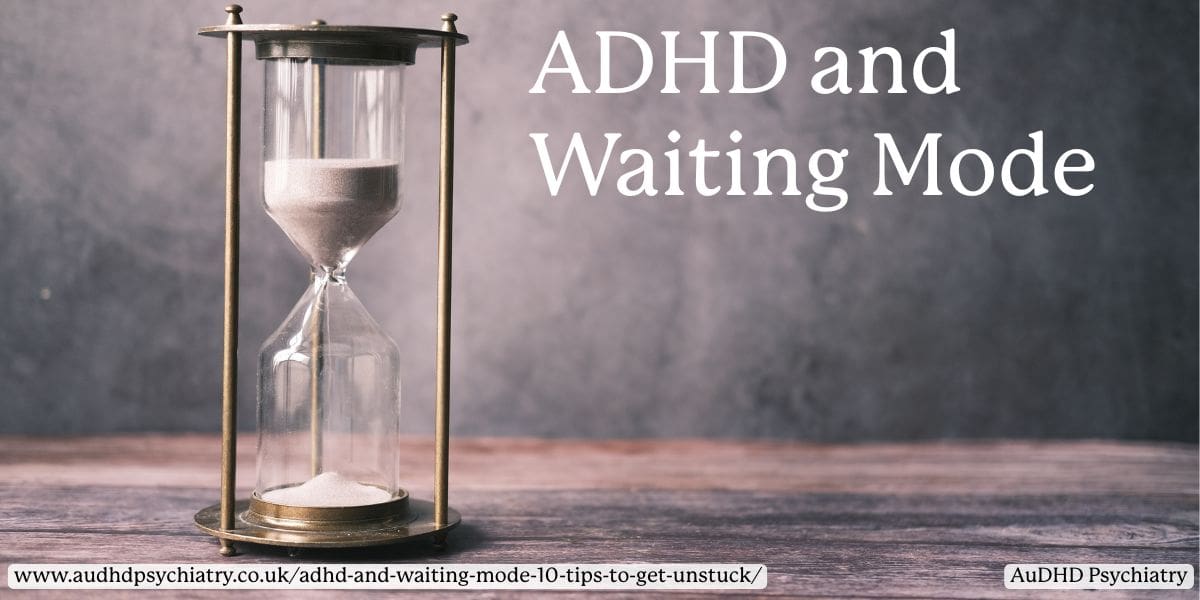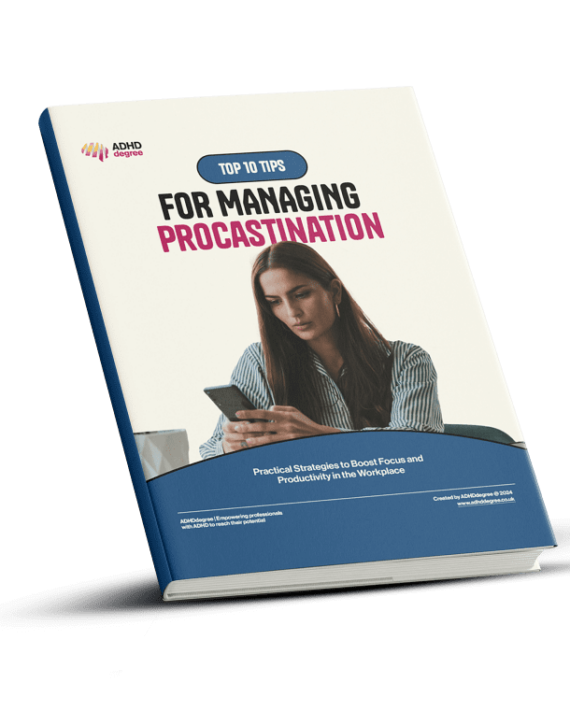What happens when a medication you depend is not available? For thousands of individuals across the UK living with ADHD, this has become an increasingly common and concerning reality. With ongoing ADHD medication shortages affecting widely used treatments such as methylphenidate, Elvanse, and Concerta XL, many patients have been left scrambling to find alternatives or going without entirely.
These supply issues are not just inconvenient; they can disrupt daily functioning, increase emotional stress, and affect everything from school performance to work productivity. For individuals with attention deficit hyperactivity disorder (ADHD), consistent access to medication is often essential for symptom regulation, particularly where stimulant medications form the core of treatment.
This guide offers clear, actionable steps for handling ADHD medication shortages safely. Whether your prescription is delayed, your pharmacy is out of stock, or you are unsure how to proceed, we’ll walk through how to manage short-term gaps, explore alternative treatments with your healthcare provider, and support your mental health in the meantime. We’ll also look at non-medication coping strategies, symptom tracking tools, and how to stay informed during this ongoing public health challenge.
Why Is There a Shortage of ADHD Medication?
The current shortage of ADHD medications across the UK has had a significant impact on both individuals and families who rely on these treatments for daily functioning. This ongoing supply issue affects a wide range of prescription stimulants, including methylphenidate and lisdexamfetamine (commonly known by brand names such as Concerta and Elvanse). While demand for ADHD treatment has grown sharply in recent years, the production and distribution of these medications have not kept pace.
What Is Causing the Shortage?
Multiple factors contribute to the short supply. These include global supply chain issues, manufacturing delays, and increased demand following rising ADHD diagnoses among both children and adults. Pharmaceutical companies have cited production constraints, while others point to regulatory bottlenecks and drug manufacturing limits enforced by the UK government. The result is a shortage that affects both NHS and private patients, often forcing them to switch to different brands or face temporary discontinuation.
Who Is Affected?
This shortage impacts a wide group: from school-age children requiring daily stimulant medication for ADHD, to working adults relying on consistent focus and executive function. Many families are reporting difficulty locating even generic versions of common medications such as methylphenidate, and have turned to independent pharmacies or online prescription services in hopes of filling their script.
What to Do If You Can’t Get Your ADHD Prescription
Facing an unexpected delay in accessing your ADHD prescription can be distressing. However, there are immediate steps you can take to improve your chances of securing medication or finding an appropriate substitute. These actions can help you stay on track with your ADHD treatment plan while minimising disruption to your daily routine.

Contact Your Prescriber First
If your usual pharmacy is out of stock, your first call should be to your prescriber or specialist ADHD team. They may be able to recommend an alternative medication, adjust your dosage temporarily, or issue a new prescription for a different pharmacy. In some cases, they may suggest a short pause in treatment, though this should always be based on clinical guidance, not urgency alone.
Check Multiple Pharmacies
Contact several local and independent pharmacies, as stock levels vary. Pharmacies may also be willing to split your prescription between locations or place a special order. Online prescription services, though not always immediate, sometimes carry supplies when high street pharmacies are out. Be sure to check NHS-supported options as well as reputable private pharmacies with licensed prescribers.
If you are nearing the end of your supply, do not wait until the last few days to request a repeat prescription. During a nationwide ADHD med shortage, ordering prescriptions early and checking availability weekly can help prevent lapses in treatment.
Can You Switch ADHD Medications During a Shortage?
Switching to a different ADHD medication may be necessary if your usual prescription remains unavailable. While this can be an effective way to maintain symptom control, changes in formulation, active ingredients, or dosage form can affect how your body responds. Always consult a healthcare provider before switching, even if you’re transitioning between similar medications.
Understanding Generic and Branded Differences
Some patients may switch from branded Concerta XL to a generic methylphenidate variant, such as Xenidate XL. While both contain the same active ingredient, differences in release mechanisms and fillers can alter their effectiveness. Likewise, alternatives to Elvanse, such as dexamfetamine, may offer a comparable stimulant effect but often have shorter durations or require more frequent dosing.
Exploring Non-Stimulant Alternatives
In cases where stimulant drugs are not available or no longer tolerated, non-stimulant ADHD medications such as atomoxetine, guanfacine, or Intuniv may be used. These are often prescribed off-label and have a slower onset of action, but they can still provide effective symptom control for some individuals. Non-stimulant ADHD medication also presents fewer risks of side effects related to heart rate or appetite loss.
If you’re switching medications for the first time, our article on starting ADHD medication explains what to expect and how to monitor early responses.
Is It Safe to Take a Break from ADHD Medication?
Taking a break, also known as a drug holiday, may be a reasonable option for certain individuals during the shortage, but it should never be done without medical advice. The decision depends on the individual’s age, symptom severity, and treatment history. In some cases, short treatment breaks may help reduce side effects or reassess the ongoing need for medication.
When Might a Break Be Appropriate?
Low-stress periods, such as holidays or school breaks, may be appropriate times for a pause. For instance, a child with inattentive-type ADHD might cope well without medication during a summer break, particularly if behavioural therapy and routines remain in place. Adults with mild symptoms and strong coping strategies may also tolerate short pauses.
Who Should Avoid Drug Holidays?
Individuals with severe ADHD symptoms, coexisting mental health conditions, or a history of substance use should not stop treatment abruptly. Withdrawal symptoms such as low energy, sleep disruption, or loss of focus are common. These effects can impact work performance, academic progress, and emotional well-being.
If a break is being considered, track symptoms closely and maintain open communication with your clinician. For additional context, refer to our complete guide on pausing or stopping ADHD medication safely, which explains how to do so under professional supervision.
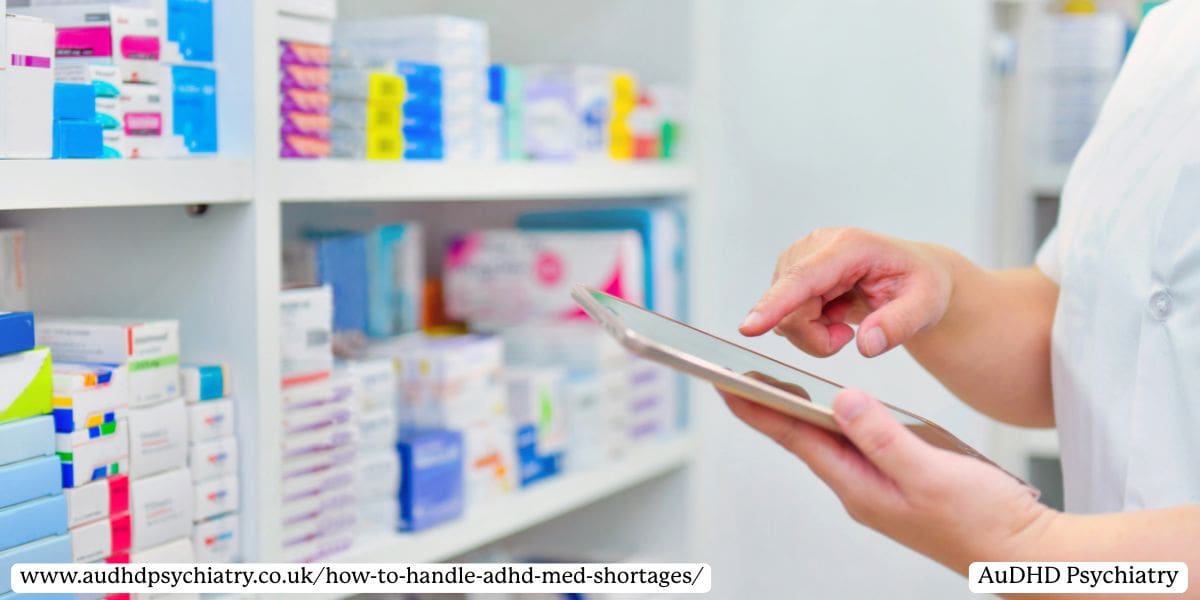
What to Do If Your ADHD Prescription Cannot Be Filled
If your local pharmacy has run out of your usual ADHD medication, such as methylphenidate or lisdexamfetamine, your first step is to contact your prescribing clinician. They may be able to recommend short-term alternatives or adjust your current treatment plan. Some may also issue a new prescription that can be sent to a different pharmacy, including independent or online dispensaries. Early intervention is key to preventing a complete disruption in symptom management.
Explore Different Pharmacies and Locations
Do not rely on a single pharmacy. Call around, including national chains, smaller local chemists, and online services. Some platforms allow you to check the stock levels of medications like Concerta XL, Elvanse, or atomoxetine across multiple branches in real time. In some cases, pharmacies may be willing to split your prescription or dispense a partial amount until full stock is available.
Request Script Transfers or Paper Prescriptions
Your prescriber may issue a paper prescription or redirect an electronic script to a pharmacy with available stock. This flexibility can be crucial during a stimulant shortage when certain brands are out of stock in one area but still available elsewhere.
Can You Switch ADHD Medications During a Shortage?
In many cases, switching ADHD medications is possible, but this should only be done with clinical oversight. Your provider might suggest a comparable stimulant or a non-stimulant ADHD medication if your usual prescription is unavailable.
Examples of Common Substitutions
If you typically take Elvanse (lisdexamfetamine), you may be offered dexamfetamine sulphate as a short-term alternative. Similarly, if Concerta XL (a long-acting methylphenidate) is out of stock, a generic methylphenidate tablet or another brand like Xenidate XL may be available. Non-stimulants like atomoxetine or guanfacine may also be considered when stimulant medications are not an option.
Watch for Differences in Onset, Duration, and Side Effects
Each formulation differs in how it works. Immediate-release stimulants typically wear off more quickly than extended-release versions, potentially requiring multiple daily doses. Non-stimulant alternatives may take weeks to show full effects and come with their own side effect profile, including changes in blood pressure, appetite, and mood regulation.
Your healthcare provider will guide you through this transition. If you would like to learn more about how different medications compare, visit our ADHD medication 101 guide.
Working With Your Doctor to Manage the Shortage
Your ADHD specialist or GP advice plays a critical role during this period of limited supply. Regular communication ensures that your care remains consistent and that any changes are medically appropriate.
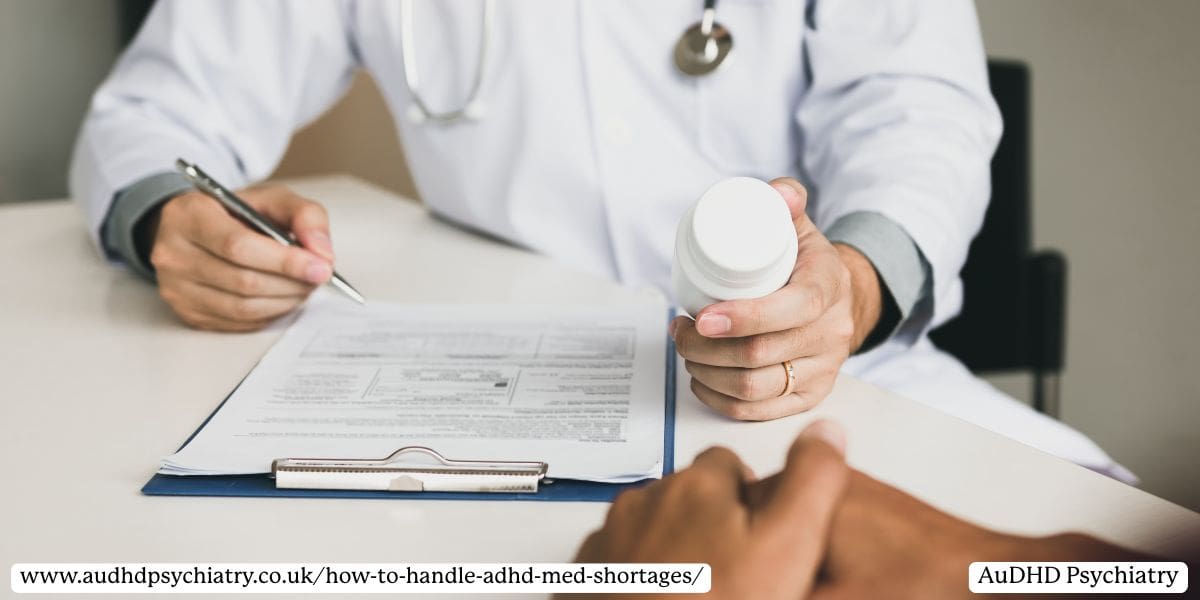
Ask About Safe Alternatives and Adjustments
Your provider may recommend a temporary dose reduction, substitute medication, or a structured treatment break. This might include switching to a lower dose of your current prescription or exploring a non-stimulant option with fewer side effects and more flexible availability.
In cases where medication must be paused, your doctor may offer documentation to support academic or workplace accommodations, such as reduced workload or extra time for tasks. Delays can also occur due to insurance plans or NHS authorisation requirements. Make sure your prescriptions are ordered early and check whether prior approval is needed for an alternative ADHD drug. If you are navigating this as a parent, we’ll discuss supporting your child through the shortage of ADHD medication in a later section.
Is It Safe to Take a Medication Break During the Shortage?
For some individuals, pausing medication may be medically acceptable, but it must be done under supervision. A short-term break, known as a “drug holiday,” may be advised in cases where medication is not available or side effects are becoming difficult to manage.
When a Break Might Be Acceptable
If symptoms are mild or manageable, your provider may approve a temporary pause, especially during school holidays or low-stress periods. Individuals with fewer ADHD symptoms, such as impulsivity or hyperactivity, may tolerate a brief interruption better than others.
When It Is Not Recommended
Stopping ADHD medication abruptly is not appropriate for everyone. Children with significant behavioural difficulties or adults with coexisting conditions such as anxiety or depression may be at risk of emotional dysregulation or rebound symptoms. If you are experiencing these concerns, review our article on managing ADHD medication side effects for additional guidance.
Always work with your prescriber to ensure any pause is safe, structured, and supported by an alternative symptom management plan.
Tracking Symptoms and Side Effects Without Medication
When prescription delays occur due to an ADHD medicine shortage, tracking symptoms becomes a crucial part of managing your health. Daily documentation allows both you and your healthcare provider to understand the effects of the pause and to determine whether an adjustment, tapering plan, or alternative treatment might be necessary.
What to Track Daily
Use a simple symptom log or tracking app to monitor changes in focus, mood, sleep, appetite, and energy. Adults might also record work productivity, social engagement, and emotional regulation. For children, insights from teachers, caregivers, and parents offer a more comprehensive view of how the shortage impacts learning, behaviour, and emotional stability.
Best Tools for ADHD Symptom Monitoring
Digital apps like Bearable, Inflow, and ADHD Tracker are helpful for daily ADHD symptom recording. These tools allow you to chart intensity, triggers, and time-of-day variations, which are useful when assessing whether certain medication changes or non-stimulant options might help. If your ADHD medication UK prescription is on hold, symptom data may support requests for prior authorisation of substitute therapies.
Non-Medication Coping Strategies While Off Medication
For individuals experiencing a temporary disruption in ADHD prescription access, behavioural strategies become essential. While stimulant medications are central to many treatment plans, non-pharmacological approaches play a key role in maintaining stability during shortages.
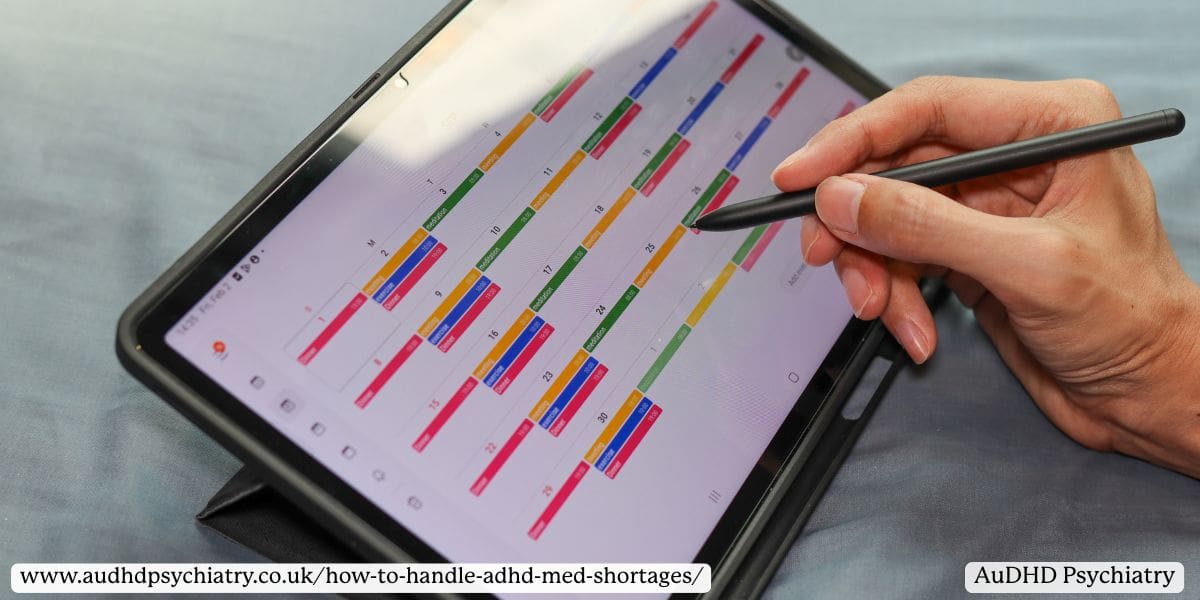
Lifestyle and Environmental Adjustments
Structured routines, physical activity, and sleep hygiene form the foundation of ADHD symptom regulation. Maintaining a consistent bedtime, avoiding energy drinks, and using white noise can improve rest. Short bursts of exercise, such as walking or stretching, can boost dopamine and improve focus naturally.
Focus Tools and Emotional Regulation
Time-blocking, task batching, and visual schedules help maintain productivity without medication. Individuals may also benefit from grounding techniques such as deep breathing or guided meditation. Children and teens can respond well to positive reinforcement strategies, visual cues, and regulated screen time.
Our ADHD resources and tools list offers suggestions to support non-medication-based routines. These coping strategies are especially helpful while you wait for the ADHD medication shortage UK to resolve.
How Parents Can Support Their Children Through a Medication Shortage
ADHD medication shortages can be particularly challenging for families. When treatment interruptions affect a child, parents must balance structure, communication, and advocacy while managing daily responsibilities. Explain the situation honestly using age-appropriate language. Reassure them that they are not at fault and that temporary changes are part of a larger plan to help them feel better. Predictable routines, clear expectations, and visual schedules can reduce stress and emotional reactivity.
Coordinating With School and Teachers
Alert teachers and support staff to the medication interruption. Schools may be able to provide accommodations such as quiet workspaces, sensory aids, or modified homework plans. Updating your child’s IEP or Behaviour Support Plan ensures temporary changes are documented and supported. If you’re waiting on a diagnosis or wish to explore personalised support, a private ADHD assessment for children may offer quicker access to interventions during long NHS wait times.
Offering Support at Home
Use visual cues, reward charts, and clear boundaries to manage behaviour. Reinforce positive efforts, offer consistent praise, and model emotional regulation. These adjustments can help children cope with ADHD symptoms during a medication gap without feeling overwhelmed or unsupported.
What Pharmacies and Healthcare Providers Are Doing About It
The current ADHD meds shortage in the UK has led to an evolving set of responses from both public and private healthcare sectors. Being aware of these efforts can help you navigate your options while you await medication availability.
NHS and Private Sector Solutions
Some private clinics have begun importing medications under special-use exemptions or offering generic alternatives when Concerta XL shortage UK concerns arise. NHS providers may recommend alternative medications, especially where supply issues are ongoing. These substitutes must still meet clinical standards and be adjusted for dosage accuracy.

Prescription Adjustments and Stock Sharing
Pharmacies are coordinating stock transfers and may offer partial prescriptions (e.g. one week at a time) to tide patients over. Patients are encouraged to contact different pharmacies or request that prescriptions be faxed or electronically transferred to locations with available supply. Always ask if your usual pharmacy can split fills or provide a short-term workaround.
Staying Informed and Connected
Organisations such as the MHRA and the Department of Health and Social Care publish regular updates on ADHD drug shortage information. Patients can also contact their specialist clinics for provider-specific updates and workarounds.
FAQs About Managing the ADHD Medication Shortage
-
Can I buy ADHD medication online in the UK?
It is not recommended to buy ADHD medication online unless the source is a registered UK pharmacy with a valid prescription. While search terms like “buy ADHD medication online UK” or “methylphenidate buy online” may appear, purchasing from unverified websites can be dangerous and illegal. Always consult with your GP or ADHD specialist and use regulated services for safe access to medication.
-
Is it legal to use a stock checker for Elvanse in the UK?
Yes, services such as an “Elvanse stock checker UK” can help patients find pharmacies that have stock available. These tools are legal and can be useful during shortages. However, stock checkers should be used in coordination with your healthcare provider to avoid delays in prescription fulfilment or unlicensed substitutions.
-
Can I get ADHD medication without an NHS prescription?
In the UK, you cannot legally access stimulant medication without a prescription, even if you search for “buy ADHD medication UK” or “how to get ADHD medication UK.” Your options include the NHS, private healthcare providers, or specialist clinics. Private assessments may allow faster access to prescriptions when NHS wait times are long.
-
What happens if I combine ADHD medication with energy drinks?
Mixing stimulant medications with “energy drinks” can increase your heart rate, cause jitteriness, or worsen anxiety. During a shortage, patients may be tempted to use caffeine-heavy products to compensate, but this can be harmful. Speak to your provider before making any changes, even temporary ones.
-
Can Intuniv be used during a UK ADHD medication shortage?
Intuniv (guanfacine) is a non-stimulant medication sometimes used off-label in the UK for ADHD, particularly in children. It may be considered during stimulant shortages, but it is not appropriate for everyone. Always discuss options with your prescriber, especially if you’re exploring “alternative medications” due to the current supply issues.
How to Handle ADHD Med Shortages: Conclusion
The ongoing ADHD medication shortage has disrupted routines for countless individuals and families. Whether you are navigating a Concerta XL shortage UK, searching for ADHD meds UK alternatives, or simply wondering how to maintain focus during a gap in treatment, the key is proactive planning and open communication with your healthcare team.
From exploring non-stimulant options like atomoxetine or Intuniv to adjusting lifestyle strategies such as sleep, diet, and daily structure, there are many safe and effective ways to support symptom management. Avoid the temptation to buy methylphenidate online or rely on unverified ADHD drug shortage remedies found online. Instead, focus on regulated care, symptom tracking, and support networks.
If you’re struggling with prescription delays or are concerned about switching to a new prescription, know that help is available. For personalised medical advice, early access to assessments, and guidance tailoread to your needs, we encourage you to book a private ADHD assessment with our team of experts. While the shortage may continue, a clear plan and the right support can help you manage symptoms effectively in the meantime.

